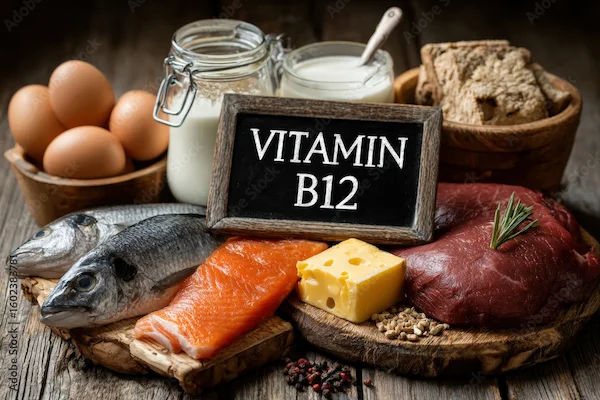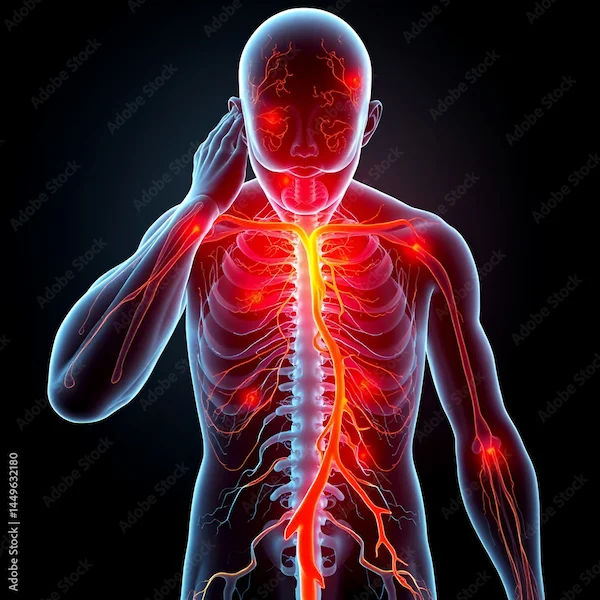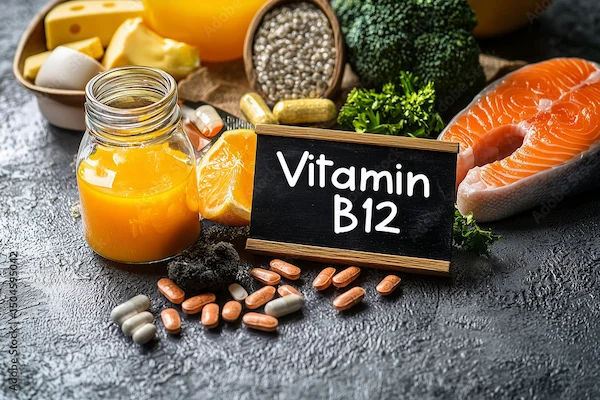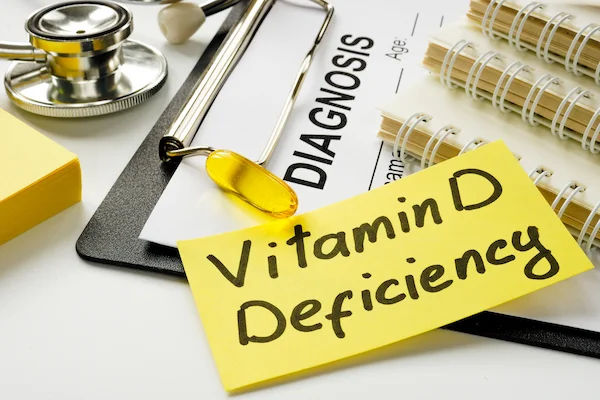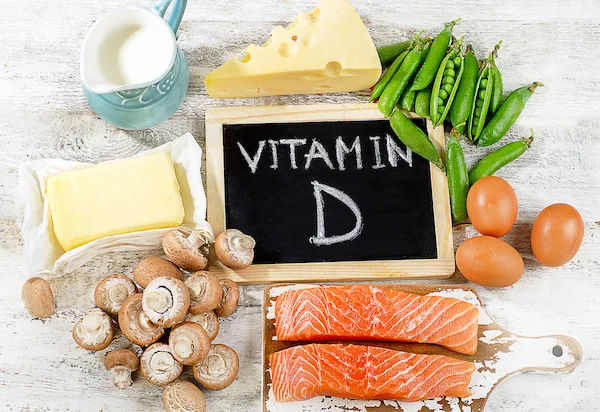Vitamin D Deficiency Symptoms and Signs
Learn the common symptoms and signs of vitamin D deficiency, including fatigue, bone pain, muscle weakness, and mood changes. Early recognition helps prevent complications and supports timely treatment.

Written by Dr. Shaik Abdul Kalam
Reviewed by Dr. Rohinipriyanka Pondugula MBBS
Last updated on 20th Aug, 2025

Introduction
Vitamin D is an essential nutrient that helps our body absorb calcium, maintain strong bones, and support immune function. However, many people suffer from vitamin D deficiency without even realising it. If left untreated, it can lead to serious health problems.
What Are the Symptoms of Vitamin D Deficiency?
Vitamin D deficiency often goes unnoticed because its symptoms can be mild or mistaken for other conditions. Here are some common signs to watch out for:
1. Fatigue and Weakness
Feeling unusually tired, even after a good night’s sleep, can be a sign of low vitamin D levels.
2. Bone and Muscle Pain
Vitamin D helps with calcium absorption, so a deficiency can lead to bone pain, back pain, or muscle aches.
3. Frequent Illnesses
Since vitamin D supports the immune system, low levels may make you more prone to colds, flu, or infections.
4. Mood Changes
Low vitamin D has been linked to depression, anxiety, and mood swings, especially in winter (when sunlight exposure is low).
5. Slow Wound Healing
If cuts or injuries take longer to heal, it could be due to insufficient vitamin D.
6. Hair Loss
Severe deficiency may lead to hair thinning or excessive hair loss.
7. Bone Loss (Osteoporosis)
Long-term deficiency can weaken bones, increasing the risk of fractures and osteoporosis.
If you experience these symptoms, consider getting a vitamin D test to check your levels.
Get Your Symptoms Checked
What Causes Vitamin D Deficiency?
Several factors can contribute to low vitamin D levels:
1. Lack of Sunlight Exposure
Our skin produces vitamin D when exposed to sunlight. People at high risk include those who:
Spend most time indoors
Wear sunscreen all the time
Live in cold or cloudy regions
2. Poor Diet
Vitamin D is found in fatty fish (salmon, tuna), egg yolks, and fortified foods (milk, cereals). A diet lacking these can lead to a deficiency.
3. Darker Skin Tone
Melanin (skin pigment) reduces vitamin D production, so people with darker skin may need more sun exposure.
4. Obesity
Vitamin D gets stored in fat, so people with higher body fat may have lower levels available for use.
5. Age
Older adults produce less vitamin D from sunlight and may have weaker absorption from food.
6. Medical Conditions
Certain diseases (like celiac disease, kidney disorders, or Crohn’s disease) can interfere with vitamin D absorption.
Consult Top Specialists for Personalised Tips
How Does Vitamin D Deficiency Affect Your Health?
If left untreated, low vitamin D can lead to:
Weaker bones (osteoporosis, rickets in children)
Higher risk of heart disease
Increased risk of diabetes
Weakened immunity (more infections)
Mood disorders (depression, seasonal affective disorder)
How to Improve Vitamin D Levels Naturally?
Here’s how to improve your vitamin D levels naturally:
1. Get Safe Sun Exposure
Spend 10-30 minutes in sunlight (without sunscreen) at least 3-4 times a week.
Best time: Morning (before 10 AM) or late afternoon (after 4 PM).
2. Eat Vitamin D-Rich Foods
Fatty fish (salmon, mackerel)
Egg yolks
Fortified milk, cereals, and orange juice
Mushrooms (exposed to sunlight)
3. Take Supplements (If Needed)
Vitamin D3 (cholecalciferol) is the best form.
Consult a doctor for the right dosage.
4. Maintain a Healthy Weight
Exercise regularly to improve vitamin D absorption.
5. Get Tested Regularly
A simple blood test can check your vitamin D levels.
When to See a Doctor?
If you experience:
Persistent fatigue, bone pain, or muscle weakness
Frequent infections
Unexplained hair loss or mood changes
It’s best to consult a doctor and get tested.
Conclusion
Vitamin D deficiency is common but often overlooked. By recognising the symptoms and making simple lifestyle changes—like getting more sunlight, eating vitamin D-rich foods, and taking supplements if needed—you can improve your health and energy levels.
If you suspect a deficiency, book a vitamin D test through Apollo 24|7 and consult a doctor for personalised advice.
Consult Top Specialists
Consult Top Specialists for Personalised Tips

Dr. Swathi Reddy Perugu
General Physician/ Internal Medicine Specialist
7 Years • MBBS, MD (General Medicine)
Hyderabad
Health plus, Hyderabad

Dr. Rajib Ghose
General Practitioner
25 Years • MBBS
East Midnapore
VIVEKANANDA SEBA SADAN, East Midnapore

Dr. Swagata Sircar
General Physician/ Internal Medicine Specialist
8 Years • MBBS, MD General Medicine
Kolkata
HealthYou Speciality Clinic & Diagnostics., Kolkata
(50+ Patients)

Divyashree K
General Physician/ Internal Medicine Specialist
5 Years • MBBS
Bengaluru
Apollo Clinic, JP nagar, Bengaluru

Dr. Smitha Nagaraj
General Physician/ Internal Medicine Specialist
15 Years • MBBS, Diploma in Family Medicine
Bengaluru
Apollo Medical Center, Marathahalli, Bengaluru
Consult Top Specialists

Dr. Swathi Reddy Perugu
General Physician/ Internal Medicine Specialist
7 Years • MBBS, MD (General Medicine)
Hyderabad
Health plus, Hyderabad

Dr. Rajib Ghose
General Practitioner
25 Years • MBBS
East Midnapore
VIVEKANANDA SEBA SADAN, East Midnapore

Dr. Swagata Sircar
General Physician/ Internal Medicine Specialist
8 Years • MBBS, MD General Medicine
Kolkata
HealthYou Speciality Clinic & Diagnostics., Kolkata
(50+ Patients)

Divyashree K
General Physician/ Internal Medicine Specialist
5 Years • MBBS
Bengaluru
Apollo Clinic, JP nagar, Bengaluru

Dr. Smitha Nagaraj
General Physician/ Internal Medicine Specialist
15 Years • MBBS, Diploma in Family Medicine
Bengaluru
Apollo Medical Center, Marathahalli, Bengaluru
.png) Buy 2, Get EXTRA OFF!
Buy 2, Get EXTRA OFF!